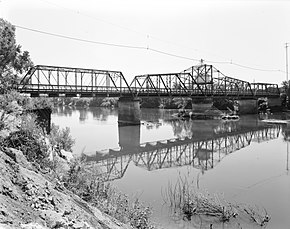John Buck Leonard (1864–1945) was a pioneering bridge engineer and architect, early advocate for reinforced concrete, working mainly in northern California.


Life
editLeonard was born in Union City, Michigan, and educated at Michigan State and the University of Michigan before going west in 1888. After brief periods in San Diego and Los Angeles, he settled in San Francisco. From 1889 he was employed there doing iron and steel engineering for various firms, including the Southern Pacific Railroad. Leonard opened his own consulting civil engineering office in 1904.[1]
Even in the aftermath of the 1906 San Francisco earthquake, resistance to fireproof reinforced concrete was strong. Leonard's analyses of concrete's superior performance in the earthquake and fire, especially Ernest L. Ransome's two buildings at Stanford University, and a constant stream of his articles and editorials in Architect and Engineer of California, changed the city's ordinances and gained national attention.[1]
As of 1913 Leonard was in partnership with William Peyton Day. Together they produced the pamphlet The Concrete Bridge, showing examples and analyses of Leonard's work.[2] In 1916 Day left to form the noted San Francisco firm of Weeks and Day.[1]
Leonard would engineer about 20 buildings in post-1906 San Francisco, become increasing involved in building inspection, and ultimately design about 45 bridges in California.
Work
editLeonard's work includes:[3]
- Virginia Street Bridge, Reno, Nevada, 1905 (demolished in 2016)[4][5]
- Clune's Auditorium (aka Temple Auditorium), Los Angeles, California, 1906 (demolished), with architect Charles Whittlesey
- Engineering for the Sheldon Building, San Francisco, 1906, for architect Benjamin Geer McDougall[6]
- Fernbridge, over the Eel River south of Eureka, California, 1911 (unmodified, extant)
- Gianella Bridge on State Highway 32, a steel swing bridge (one of Leonard's few steel designs) spanning the Sacramento River between Glenn and Butte Counties, 1911 (demolished 1987)
- Van Duzen Bridge, spanning Van Duzen River at State Highway 36, Carlotta vicinity, Humboldt, California, 1922 (demolished)[7]
- Chili Bar Bridge, spanning South Fork of American River at State Highway 193, Placerville vicinity, El Dorado, California, 1922 (demolished)[8]
- Honcut Bridge, spanning South Honcut Creek at Honcut Road, Loma Rica, Yuba County, California, 1914 (demolished)[9]
References
edit- ^ a b c Yearby, Jean P. (1985). "Gianella Bridge" (PDF). Historic American Engineering Record. Washington, D.C.: Library of Congress. Retrieved March 8, 2023.
- ^ Leonard, Jno. B; Day, W. P. (1913). The Concrete Bridge: How It Has Proved Itself in California. San Francisco: Press of H. S. Crocker Co.
- ^ John B. Leonard at Structurae.
- ^ "Virginia Street Bridge". 2011-06-13. Archived from the original on 2011-06-13. Retrieved 2023-03-10.
- ^ DeLong, Jeff. "Work to start on 'crumbling' Virginia Street Bridge". Reno Gazette Journal. Retrieved 2023-03-10.
- ^ Historic American Buildings Survey (HABS) No. CA-2203, "Sheldon Building, 9–15 First Street, San Francisco, San Francisco County, California".
- ^ Historic American Engineering Record (HAER) No. CA-9, "Van Duzen Bridge, Spanning Van Duzen River at State Highway 36, Carlotta, Humboldt County, California".
- ^ HAER No. CA-137, "Chili Bar Bridge, Spanning South Fork of American River at State Highway 193, Placerville, El Dorado County, California".
- ^ HAER No. CA-289, "Honcut Bridge, Spanning South Honcut Creek, Loma Rica, Yuba County, California".